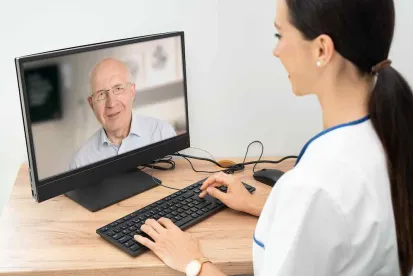Massachusetts has a new telehealth law on the books, signed into law by Governor Charlie Baker as part of a comprehensive healthcare bill. The telehealth provisions constitute only a portion of the 70-page legislation, but represent the first major formalization of telehealth laws in Massachusetts. The Act was successfully signed into law on January 1, 2021, following several years of proposed legislation and unsuccessful attempts at laws on insurance coverage and practice standards. This article highlights the top three changes in the Act for telemedicine and digital health companies.
1. New Definition of Telehealth for Medical Practice
For medical practice standard purposes, the Act adds a new Section 5O under the laws on physician professional regulation, broadly defining telehealth to include a range of modalities. Telehealth is defined as “the use of synchronous or asynchronous audio, video, electronic media or other telecommunications technology, including, but not limited to: (i) interactive audio-video technology; (ii) remote patient monitoring devices; (iii) audio-only telephone; and (iv) online adaptive interviews, for the purpose of evaluating, diagnosing, consulting, prescribing, treating or monitoring of a patient's physical health, oral health, mental health or substance use disorder condition.”
This new definition differs from the one currently found in the Massachusetts Board of Registration in Medicine (Medical Board) regulation, which defines telemedicine as “the provision of services to a patient by a physician from a distance by electronic communication in order to improve patient care, treatment or services.” While the two definitions are not in conflict, presumably the new statutory definition would supersede and control over the regulatory definition.
The Act does not address creating a new doctor-patient relationship via telehealth without an in-person examination. But there was no prior law expressly prohibiting the practice or mandating an in-person exam, provided the care was consistent with clinical standards. Historically, the Medical Board had declined to publish any formal guidance on telehealth practice standards, though it recognized the practice of medicine does include telemedicine (i.e., the “provision of services to a patient by a physician from a distance by electronic communication in order to improve patient care, treatment or services”). On June 25, 2020, the Medical Board finally issued a permanent telehealth Policy 2020-01, stating:
“The practice of medicine shall not require a face-to-face encounter between the physician and the patient prior to health care delivery via telemedicine. The standard of care applicable to the physician is the same whether the patient is seen in-person or through telemedicine.”
The Medical Board also has Prescribing Practices Policy and Guidelines (Policy 15-05; last rev. Oct. 8, 2015), which discuss expectations for an appropriate patient examination when prescribing over the internet or other electronic process. The policy contains no express requirement for an in-person exam, but states, in pertinent part:
“To be valid, a prescription must be issued in the usual course of the physician’s professional practice, and within a physician-patient relationship that is for the purpose of maintaining the patient’s well-being. In addition, the physician must conform to certain minimum standards of patient care, such as taking an adequate medical history, doing a physical and/or mental status examination and documenting the findings. This rule applies to any prescription, issued by any means, including the Internet or other electronic process. Prescribing that does not meet these requirements is unlawful.”
In drafting that policy, the Medical Board cited the Federation of State Medical Boards in commenting that “measures should be employed to ‘uphold patient safety in the absence of traditional physical examination” and that the use of telemedicine to prescribe be “in accordance with current standards of practice and consequently carry the same professional accountability as prescriptions delivered during an encounter in person.’” See Policy 15-05 (rev. Nov. 17, 2010).
The Medical Board also maintains a separate Internet Prescribing Policy (Policy 03-06; last rev. Dec. 17, 2003), which provides:
“To satisfy the requirement that a prescription be issued by a practitioner in the usual course of his professional practice, there must be a physician-patient relationship that is for the purpose of maintaining the patient’s well-being and the physician must conform to certain minimum norms and standards for the care of patients, such as taking an adequate medical history and conducting an appropriate physical and/or mental status examination and recording the results. Issuance of a prescription, by any means, including the Internet or other electronic process, that does not meet these requirements is therefore unlawful.”
Like the Medical Board’s other policies that touch on telehealth, its Internet Prescribing Policy does not expressly require an in-person exam for all prescriptions, instead requiring the prescribing physician to create a valid doctor-patient relationship, conform to norms and standards for the care of patients, and ensure all prescribing is made in the usual course of professional practice. The emphasis on prescribing only for a legitimate medical purpose in the usual course of his professional practice is similarly contained in Massachusetts laws on prescribing controlled substances. Remember: even of if a state’s law allows prescribing for controlled substances based upon a telemedicine evaluation, federal law must also be addressed, and the Ryan Haight Act preempts more permissive state law.
2. Telemedicine Credentialing by Proxy
The Act requires the Medical Board to allow credentialing by proxy and privileging for telehealth services, reversing the Board’s historical position to disallow proxy credentialing. This change is a welcome victory for hospitals in Massachusetts, both rural critical access hospitals and urban academic medical centers. The law states:
“Notwithstanding any provision of this chapter to the contrary, the board shall allow a physician licensed by the board to obtain proxy credentialing and privileging for telehealth services with other health care providers, as defined in section 1 of chapter 111, or facilities that comply with the federal Centers for Medicare and Medicaid Services’ conditions of participation for telehealth services.”
“[T]he department of public health and the office of consumer affairs and business regulation shall allow their applicable licensees to obtain proxy credentialing and privileging for telehealth services with other health care providers as defined in section 1 of chapter 111 of the General Laws or facilities that comply with the federal Centers for Medicare & Medicaid Services’ conditions of participation for telehealth services.”
For more information and practical tips on credentialing by proxy, download the free Credentialing by Proxy Guidebook published by the American Telemedicine Association and the National Association Medical Staff Services. (Lawyers on our Telemedicine & Digital Health Industry Team were contributing authors to that Guidebook.)
3. Coverage and Reimbursement of Telehealth Services
The law expands telehealth reimbursement by enacting a more robust coverage law and certain payment parity clauses. Massachusetts previously had a telemedicine coverage law on the books, but that law did not actually require coverage or parity. The new law contains these provisions, and is particularly designed to improve access to telehealth-based mental health services and substance use disorder treatment. While some of the coverage and payment provisions are not permanent, they have the potential to ultimately cement many of the expansions in telehealth adoption introduced during the COVID-19 pandemic.
We will continue to monitor for any rule changes or forthcoming subregulatory guidance on telehealth in Massachusetts.




 />i
/>i

